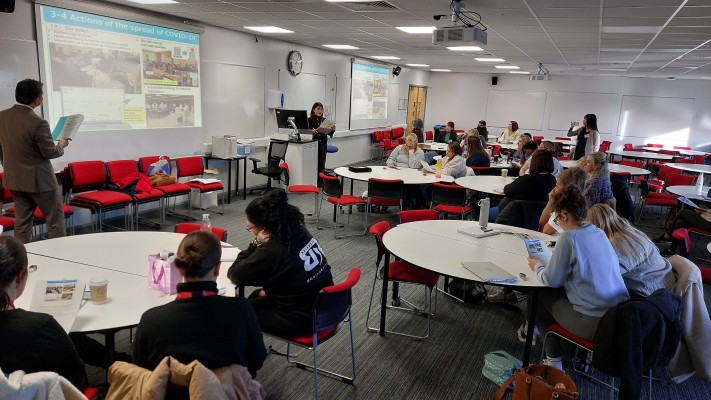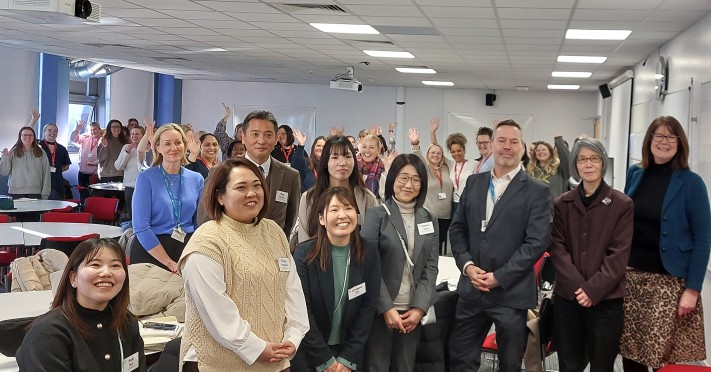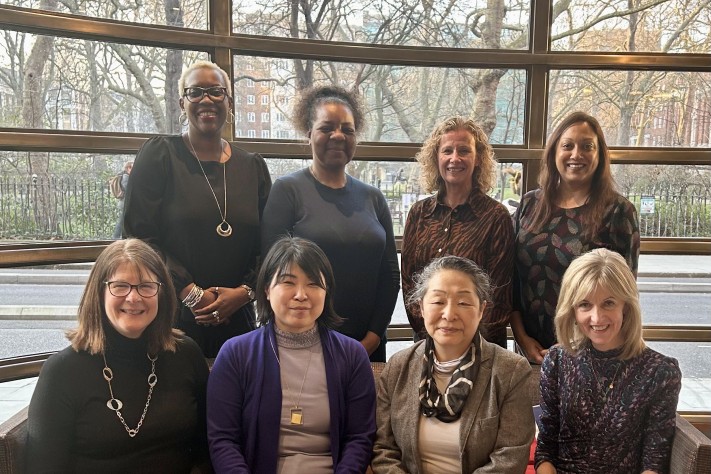28th March 2025
This Voices blog by Dr Karen Whittaker, iHV Senior Education and Workforce Lead, shares an update on connections with the Japanese Academy of Public Health Nursing which has facilitated networking and learning opportunities between some Japanese visitors and UK academics, students and practitioners.
Japan is a country with some the best health outcomes globally – where the life expectancy for men and women is better than that in all other high income countries. A commentary piece published in The Lancet last year, heralded public health nurses as Japan’s ‘hidden secret’ and significant contributors to population health. Japanese public health nurses (JPHN) share many facets with UK health visitors with a ‘social approach’ to health, where success requires investment in trusting relationships with families and communities. The iHV is fortunate to have connections with the Japanese Academy of Public Health Nursing and has, over the last decade, been facilitating networking and learning opportunities between Japanese public health practitioners, UK health visitors, academics and students. In recent years, we have hosted visits and provided presentations for members of the Japanese Society of Public Health and Japanese Academy of Public Health Nursing.
In 2023, we welcomed Professor Masako Kageyama, from Osaka University Institute of Advanced Co-Creation Studies, supporting opportunities to visit a UK children’s centre, University and the NMC London offices. This enabled Professor Kageyama to meet health visitors, school nurses, a director of public health, local authority commissioners, lecturers, doctoral students and regulators. In Japan, the regulation of public health nurses is based on laws passed during the post-war years and so there is particular interest in UK regulatory practices, standards for education, approval for practice and maintenance of quality when providing services. More recently in 2025, Professors from Nagasaki University and service providers from the Oita prefecture visited UK Universities providing the specialist community public health nurse (SCPHN) programme (including University of Central Lancashire (UCLan), Leeds Beckett University and King’s College, London). During the visits, UK SCPHN students had an opportunity to learn about the breadth of the JPHN role and examine similarities and differences to UK education and practice.

UCLan students at the lecture provided by Oita Prefecture Director for General Affairs and Planning during a Japanese visit to the UK at the end of January 2025
The UK students asked about the JPHN service structure and whether there were particular hurdles to service provision. Similar to the UK, maintaining adequate staffing and managing administrative demands were seen as ongoing challenges in Japan. However, the Japanese system provides evidence for how the PHN role can be successfully expanded to work right across the life course, fulfilling the need to ‘start well, live well and age well’ through dedicated roles for each life stage. Furthermore, JPHNs contribute as first responders in the event of a regional emergency, with the aim of minimising preventable deaths and secondary health problems. JPHNs are noted for their application of culturally competent approaches and leveraging of local social networks to enable communities to come together and withstand shocks from natural disasters, for example earthquakes and the recent COVID pandemic.

Directors of services within the Oita prefecture in Japan, meet with the Dean (Dr Andy Melling), SCPHN course lead (Angela Mason) and students at the University of Central Lancashire and Dr Karen Whittaker, iHV
During a London visit, iHV team members met with Professor Kawasaki and Dr Ohnishi from Nagasaki University to share our country perspectives and approaches to public health nurse preparation and practice. The requirements for and time taken to become qualified as a public health nurse is similar for both countries, with preparation taking three years for qualification as a nurse and a further year for qualification to work in public health. A key difference in the roles between the countries includes a service system that enables the JPHN to:
- Contribute to supporting whole communities and populations as part of national disaster strategy planning and action
- Extend health promotion and prevention interventions beyond the early years to engage with people at all stages across the life course
- Give explicit attention to the planning, implementing and evaluation of health programmes for older people – to help people age well
As the government’s plans to transform the NHS proceed, with its ambition for three shifts to support better health for the nation, ideas to make this a reality can be helped by looking beyond our borders. Learning about the Japanese experience showed our similarities and differences, but importantly it provides an example of the possibilities for achieving better population health outcomes.

iHV team and members meeting with Professor Kawaski and Dr Ohnishi from Nagasaki University during their visit to London during March 2025
Top row, L-R: Shelley McLetchie, Cameron Cox, Vicky Gilroy, Dr Sharin Baldwin
Bottom row, L-R: Dr Karen Whittaker, Prof Kawaski, Dr Ohnishi, Prof Mary Malone
Reflecting on the visits
Director for General Affairs and Planning, Oita City expressed:
“Thank you very much for planning various events at the university the other day. Your event planning has deepened our understanding of SCPHN in the UK. We would like to continue exchanging information and strive to improve the welfare of each other’s countries and regions. We look forward to your continued support.”
UCLan SCPHN students commented that:
“It was very interesting to learn about the role of Japanese PH nurses and discover the wide spectrum of their role and how multi-faceted it is. Also, it was interesting to hear about similar public health issues such as mental health, the impact of the COVID pandemic, ageing population, increasing health needs, and also in Japan the declining birth rate.
Dr Karen Whittaker, Senior Education and Workforce Lead, Institute of Health Visiting






